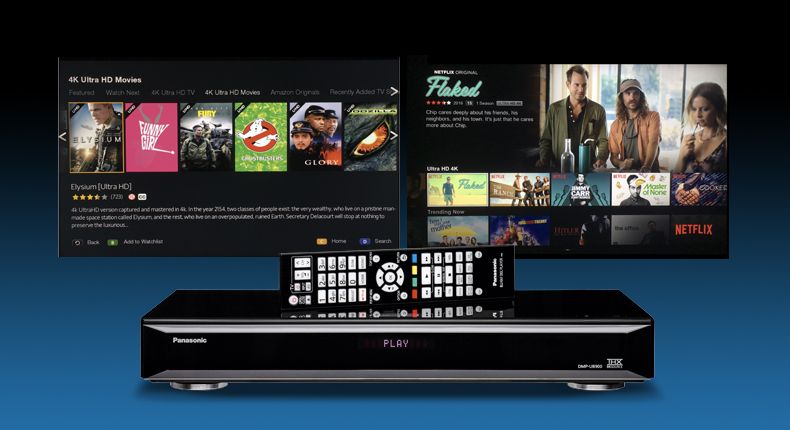As technology continues to evolve, so do the ways in which we consume media. From vinyl records to cassette tapes to CDs, we’ve seen a lot of changes in the way we listen to music. Similarly, we’ve seen changes in the way we watch movies and TV shows. In recent years, two of the biggest buzzwords in home entertainment have been “Blu-ray” and “4K”. But what do these terms mean, and how do they compare to each other?
First, let’s talk about Blu-ray. Blu-ray is a disc format that was introduced in 2006 as a successor to the DVD. It has a higher capacity than DVD, which means it can hold more data and therefore provide higher quality audio and video. Blu-ray discs can hold up to 25GB of data on a single-layer disc, or up to 50GB on a dual-layer disc. This means that movies on Blu-ray can be presented in 1080p high definition, with better color accuracy, sharper images, and more detail than DVDs.
Now, let’s talk about 4K. 4K refers to a resolution of 3840 x 2160 pixels, which is four times the resolution of 1080p. This means that 4K TVs can display more than eight million pixels, resulting in incredibly sharp and detailed images. In order to watch 4K content, you need a 4K TV, a 4K-capable streaming device, and a steady internet connection. Alternatively, you can watch 4K content on a 4K Blu-ray player or a gaming console like the Xbox One X or PS4 Pro.
So, which is better: Blu-ray or 4K? The answer, as always, is “it depends”. If you have a 1080p TV and are happy with the quality of your Blu-ray discs, then there’s no need to upgrade to 4K. However, if you have a 4K TV and want to take advantage of its full potential, then 4K is the way to go. 4K content provides a level of detail and clarity that is unmatched by any other format. Additionally, 4K Blu-ray discs can hold up to 100GB of data, which means they can provide even higher quality audio and video than standard Blu-ray discs.
Of course, there are some downsides to 4K as well. For one thing, not all movies and TV shows are available in 4K yet. Additionally, 4K content requires a lot of bandwidth, so if you don’t have a fast and stable internet connection, you may experience buffering or other issues. 4K TVs and 4K Blu-ray players can be expensive, so it may not be worth the investment if you’re not a serious home theater enthusiast.
The decision between Blu-ray and 4K ultimately comes down to personal preference and budget. If you’re happy with the quality of your Blu-ray discs and don’t want to shell out for a new TV and player, then stick with Blu-ray. However, if you’re looking for the best possible picture quality and have the means to invest in a 4K setup, then 4K is definitely worth considering.

Is Upgrading to 4K Blu-ray Worth It?
Upgrading from Blu-ray to 4K is definitely worth it if you want to experience your favorite movies at the best possible quality. While the price point may be heavy, the visual upgrade that 4K provides is unparalleled. The added resolution and dynamic range provide a much more immersive and lifelike experience, making it feel like you’re right in the middle of the action.
Furthermore, 4K technology is constantly improving, and new features such as HDR (High Dynamic Range) and Dolby Atmos sound are only available on 4K discs. These features enhance the viewing experience even further, providing deeper blacks, brighter whites, and more vibrant colors.
If you already own the trilogy on DVD or Blu-ray, it may seem like a waste of money to upgrade once again. However, the difference in quality between Blu-ray and 4K is significant enough to justify the investment.
If you’re a movie lover who values the best possible viewing experience, upgrading to 4K is definitely worth it. The added resolution and features make for a more immersive and enjoyable experience than you won’t get with a standard Blu-ray.
Does Watching Blu-ray Discs on a 4K TV Enhance the Visual Quality?
Blu-ray discs do look better on 4K TVs compared to standard HD TVs. The reason for this is that 4K TVs have more pixels than HD TVs, which allows for more precise upscaling of the content. This means that even though most programs are still in HD, they will appear crisper and more detailed on a 4K TV. Additionally, 4K TVs often have better color accuracy and contrast, which can further enhance the viewing experience. It’s worth noting that not all Blu-rays are created equal, and some may look better than others depending on the quality of the transfer and the mastering process. though, if you’re a fan of Blu-rays and want the best possible picture quality, a 4K TV is definitely worth considering.
Do All Blu-Ray Players Support 4K Playback?
Not all Blu-ray players play 4K UHD discs. The reason is that 4K UHD Blu-ray requires a higher level of technology and specifications to support the higher resolution and HDR (High Dynamic Range) content. Only the latest and more advanced Blu-ray players, known as Ultra HD Blu-ray players, are capable of playing 4K UHD discs. These players are designed to support the 4K resolution and HDR content, as well as other advanced features such as Dolby Atmos audio and wider color gamut. However, it is important to note that even if a player is capable of playing 4K UHD discs, it also depends on the compatibility of the TV or display device to which it is connected.
Conclusion
While Blu-ray discs have been the gold standard for high-definition viewing for over a decade, 4K UHD Blu-ray discs offer a significant improvement in picture quality. The increased resolution and HDR capabilities make for a more immersive and cinematic experience. However, 4K UHD Blu-ray players and discs come with a higher price tag, and not all content is available in 4K yet. That being said, if you are a movie enthusiast looking to see your favorite films in the best possible quality, investing in a 4K UHD Blu-ray player and discs is definitely worth considering. But if you are happy with the quality of your current Blu-ray collection, there may be no need to upgrade just yet. Ultimately, the decision between Blu-ray and 4K UHD comes down to personal preference and budget.








